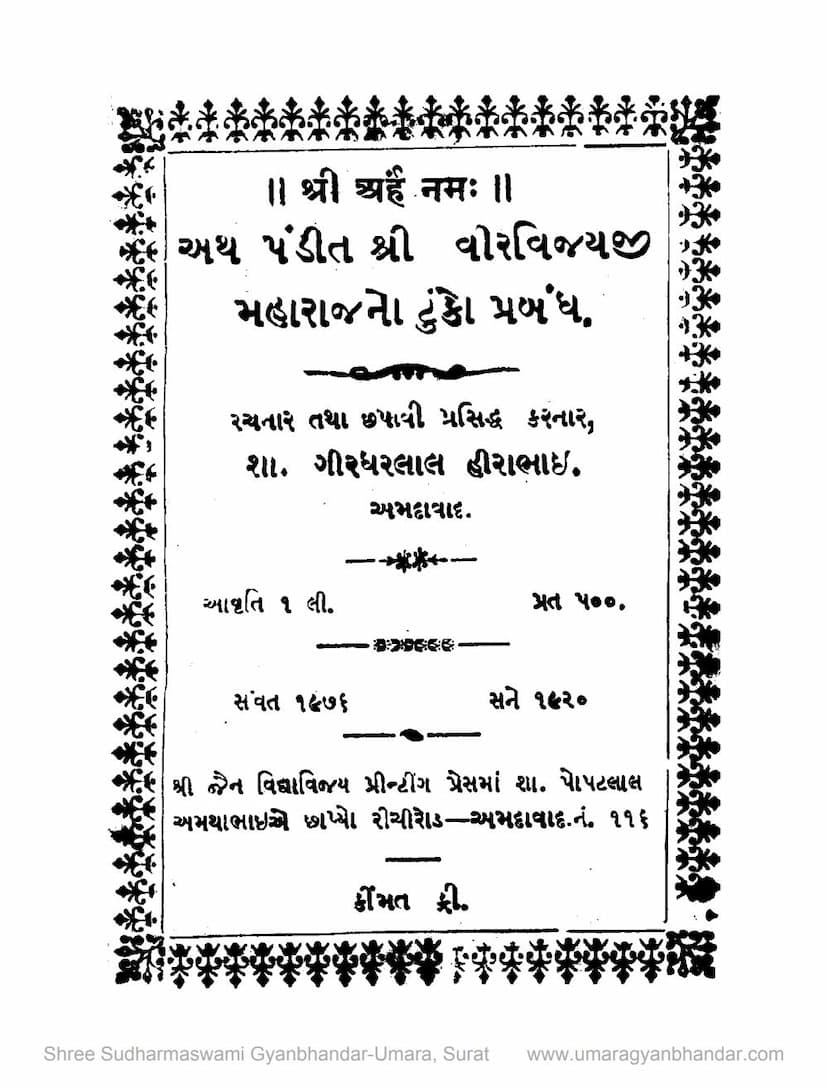Atha Pandit Shree Veervijayji Maharajno Tunko Prabandh
Added to library: September 1, 2025

Summary
Here is a comprehensive summary of the "Atha Pandit Shree Veervijayji Maharajno Tunko Prabandh" in English:
Book Title: Atha Pandit Shree Veervijayji Maharajno Tunko Prabandh (A Brief Account of Pandit Shree Veervijayji Maharaj) Author: Girdharlal Hirabhai Shah Publisher: Girdharlal Hirabhai Shah Publication Year: 1920 (Samvat 1976)
This work is a biographical account of the prominent Jain monk and scholar, Pandit Shree Veervijayji Maharaj. The author, Girdharlal Hirabhai Shah, states that this compilation is undertaken to honor his father's uncle, Shah Lalubhai Punjasa.
Key Aspects of Pandit Shree Veervijayji Maharaj's Life and Work:
-
Early Life and Renunciation:
- Veervijayji was born Keshavram, the son of Janeshwar, an Avadich Brahmin, and Vijkarakhai in Ahmedabad.
- His birth was in Samvat 1829 (1772 CE).
- He married at around 18 years old to a woman named Ralayat.
- Tragedy struck his family when his father passed away. Subsequently, Keshavram had a dispute with his mother, Vijkarakhai, leading him to leave home. His mother, along with his paternal aunt, searched for him in vain and eventually died due to distress. Keshavram's sister, Ganga, also died soon after, unable to bear the sorrow of her mother and brother's separation.
- Unaware of these family tragedies, Keshavram encountered the esteemed Jain monk Shree Shub Vijayji in Palitana, near Palitana, after falling ill in Bhimanath village near Dhule.
- Shree Shub Vijayji, a disciple of Punyas Shree Jayvijayji, was a highly virtuous monk. Keshavram's illness was cured with Shub Vijayji's help, creating a debt of gratitude.
- Following Shub Vijayji's guidance and with his permission, Keshavram did not return home. Instead, he accompanied Shub Vijayji to Khambhat.
- In Samvat 1848 (1791 CE), at Keshavram's earnest request, Shree Shub Vijayji initiated him into the Jain monastic order in Khambhat, renaming him Veervijayji.
-
Discipleship and Learning:
- Shree Veervijayji was a devoted disciple of Shree Shub Vijayji, whom he held in high esteem. He diligently served and showed immense respect to his Guru.
- Shub Vijayji was a great scholar, and Veervijayji received extensive knowledge of Jain Agamas and other scriptures from him.
- Shub Vijayji bestowed upon Veervijayji the title of "Panyas" (a senior monk/preacher) before his own passing.
- Veervijayji spent approximately 12 years with Shub Vijayji, absorbing all the knowledge and teachings possible.
-
Literary Contributions:
- Veervijayji was a highly proficient poet and scholar. He composed numerous works in both Gujarati and Sanskrit, contributing significantly to Jain literature.
- His compositions are known for their moral and spiritual teachings, presented in an engaging and delightful manner.
- The book lists a comprehensive catalog of his known works, including:
- Dhalia (songs/poems) on various Tirthankaras and deities.
- Stavans (devotional hymns).
- Rasas (narrative poems) like Sursundari ne Ras, Dhammil Kunvar ne Ras, and Chandrashekhar ne Ras.
- Pujas (devotional rituals), including the significant Ashtaprakari Puja and Chyasath Prakari Puja.
- Sajhays (songs of moral instruction).
- Chaityavandans (venerations).
- Guhali (a type of devotional song).
- Prashna Chintamani (a work in Sanskrit prose).
- His works often served to preserve the glory and details of important events, such as the consecration ceremonies of temples and the journeys of Jain congregations (Sanghs).
-
Travels and Preaching:
- Veervijayji traveled extensively throughout Gujarat and other regions, including Mewar, to spread the Jain dharma and deliver sermons.
- He participated in significant Jain pilgrimage expeditions, such as the journey to Kesariyaji and the Panchtirth pilgrimage.
- His preaching was highly impactful, often leading people to adopt Jainism.
-
Disputes and Legal Matters:
- The book mentions an instance in Surat where Veervijayji faced a dispute with the local priestly class (Tirthis) regarding the granting of upadhayapada (a title of respect and authority) to lay followers without their direct involvement.
- It also refers to a legal case in Ahmedabad involving the "Dhondia" sect, where Veervijayji was called upon as an expert witness, indicating his reputation for knowledge and wisdom.
-
Later Life and Passing:
- In Samvat 1908 (1851 CE), Veervijayji fell ill. Despite extensive care and treatment, he passed away on the third day of the waning moon of Bhadrava, a Thursday.
- His demise caused immense grief and a city-wide strike in Ahmedabad.
- His mortal remains were cremated with great honor and reverence at the Sabarmati riverbank.
- Later, in Samvat 1909, his foot impressions were enshrined in Ahmedabad.
-
Author's Perspective and Legacy:
- Girdharlal Hirabhai Shah emphasizes Veervijayji's profound scholarship, poetic talent, and deep understanding of Jain scriptures.
- He highlights Veervijayji's ability to convey complex spiritual and ethical principles in an accessible and enjoyable manner, making his works valuable for all readers, including children.
- The author laments that not all of Veervijayji's writings are preserved in his collection, but he has compiled a significant list.
- He notes that Veervijayji maintained the traditions and teachings of previous Acharyas, was a visionary leader, and was highly respected by wealthy patrons of religion.
- The author also mentions the contemporary scholarly monk, Rupvijayji, with whom Veervijayji had a friendly rivalry, both contributing immensely to the Jain community through their intellectual competition.
In essence, this "Tunko Prabandh" serves as a valuable historical and biographical document, offering insights into the life, teachings, literary contributions, and spiritual legacy of Pandit Shree Veervijayji Maharaj, a significant figure in Jainism.